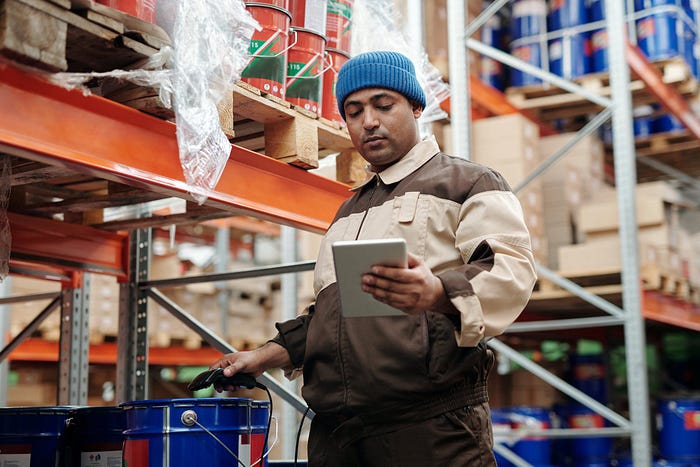
AI: The Powerhouse Behind Modern Logistics and Supply Chains
A fleeting trend or a game-changer?
As digital transformations continue to sweep across diverse sectors, the logistics industry stands as one where weaving in innovation is as tricky as it is fruitful. The difficulty involves identifying solutions that offer the highest level of effectiveness and adaptability, able to smooth over bumps in the road and deliver solid results. The fruits of these efforts are found in enhanced operational smoothness, efficient time management, and a boost in productivity.
So, where does AI stand in the logistics world when it comes to navigating these hurdles and rewarding those bold enough to adopt it? What kind of evolution has AI seen since it first made waves in the logistics field? And what impact is it likely to have on the future shape of supply chains? In this piece, I’m going to leverage my experience to address these pressing queries and others around the use of AI in logistics. My goal is to paint a detailed picture of both the present and potential rewards of AI adoption.
AI and Supply Chain Issues
A great place to start exploring the advantages of AI in logistics and supply chains is by recognizing why conventional management methods need an AI-enabled refresh. Often, people are unsure about moving to AI or look at other options first. This hesitation usually comes from not knowing about the limits of their current tech tools. Drawing from my own experiences as the Senior Director of Strategic Growth, I’ll help clear things up.
Not Enough Skilled Planners
Supply chain management needs lots of skilled workers to keep things on track. However, there’s a serious problem: as many as 64% of supply chain groups say they’re short on staff. This means that, right now, their management doesn’t have all the people it needs to plan effectively and nimbly.
Outdated Information
Older supply chain tools aren’t great at sharing up-to-date info. This means people end up using outdated data, leading to costly mistakes or missed opportunities. Worse, these tools often keep important info locked away, which can keep managers in the dark about wider issues.
Old Supply Chain Approaches
Traditional methods, which cover things like production, supplier selection, and inventory management, have become out-of-date and overly simplistic for today’s fast-paced environment. They often fail to capture potential changes or consider industry challenges. AI can step in here. It helps us handle data better, break down barriers, and organize teams well.
How AI Helps Logistics: Planning, Predicting, and Beyond
AI can add value across all aspects of logistics and supply chain operations.
So, I’ll focus on some of the most sought-after and well-recognized uses of AI in logistics, distinguishing the real benefits from the areas we could improve.
Planning
One of the biggest, if not the biggest, benefits of AI in transportation and supply chains is how it makes operations clear and open. Thanks to AI’s ability to turn data into forecasts, businesses boost key parts of logistics planning: predicting demand, finding the best routes, and planning supplies. With AI, we’re able to make informed decisions about inventory, calculate stock levels, reorder points, and more. It’s about preventing sudden stockouts and excess inventory, ultimately saving us money.
Moreover, the tech helps us with staff planning, especially during peak seasons. It ensures there’s the right number of people on hand, reducing stress and improving efficiency. AI truly makes logistics planning smarter, more efficient, and cost-effective.
Sales and marketing
AI revolutionizes logistics from more than just an operational viewpoint. It sharpens the customer approach, too. AI-driven point-of-sale forecasting uses transaction data to spot consumer buying trends at each store. This means you can customize strategies to maximize profits at every location.
Meanwhile, AI chatbots handle customer interactions, delivering fast responses and seamless service, freeing teams for complex issues. They also collect valuable customer data, helping us to create tailored marketing campaigns and monitor their success. In essence, AI is your key to growth, improving all aspects of operations, not just logistics.
Data-driven analytics
AI is a guardian against risks, ensuring productivity and safety remain steadfast amidst disruptions. It also detects irregularities and faults in processes, working with IoT sensors for prompt rectification. Furthermore, this technology delves into weak spots, improving efficiency and minimizing costs.
Notably, AI extends its benefits to team’s wellbeing, monitoring stress levels, enhancing engagement, and ensuring a balanced work environment. A crucial but often overlooked aspect of a thriving business.
What does the future hold for AI in logistics and supply chains?
Gazing into the future of AI in logistics, the horizon seems brighter than ever. Experts predict a $64 billion market value by 2030, proving AI’s growing influence in this space.
In my journey as a Senior Director of Strategic Growth, I can’t help but be thrilled at this progression. I imagine a time when AI is not just for the big players in logistics. Instead, it becomes an accessible tool for every business, whether they’re a small start-up or a well-established enterprise.
Automated warehousing
Contrary to popular belief, fully automated warehouses are not commonplace, with 80% of US warehouses still non-automated. The leap to AI-assisted operations isn’t easy, as it requires a deep understanding of unique business processes and significant resources. This is why such technology is largely limited to industry giants like Amazon today. However, I’m optimistic that the future will see automation becoming an accessible service for all, changing the face of logistics.
Automated vehicles
AI-powered vehicles have been a talking point in the logistics industry, promising increased productivity and 45% reduced costs. However, they remain bespoke solutions, and mass adoption is yet to occur. The challenge lies in ensuring the safe use of these autonomous vehicles. Companies carefully navigate this landscape, aiming for a future where safety and productivity walk hand in hand. It’s an exciting time, watching the branch evolve in tandem with these technological advancements.
Self-learning supply chains
A remarkable evolution in logistics, thanks to AI, is the emergence of adaptable, resilient supply chains that learn and react to changes. With swift data analysis and scenario planning, we can now anticipate more accurate strategies in unpredictable business landscapes. As someone involved in this transformation, I am thrilled to witness this revolutionizing shift first hand.
Conclusion
While not every groundbreaking tech seamlessly aligns with a company’s vision and operations, the versatility of AI sets it apart. It has the potential to enhance almost every facet of logistics, transportation, and supply chains, positioning itself as a catalyst for transformation in the logistics sector. In my years of experience, I truly believe this is the beginning of a new standard for the logistics industry.
